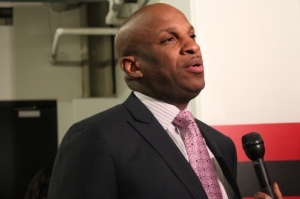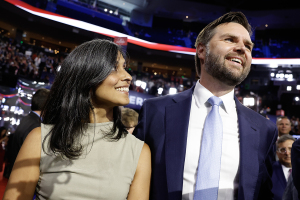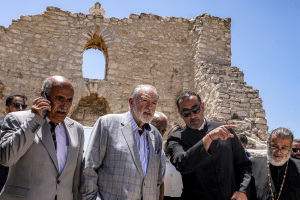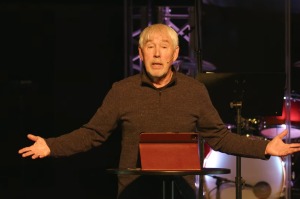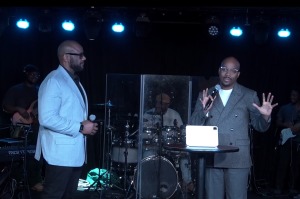How a Small-Town Preacher Became a Rising White House Contender
In front of cameras, behind the pulpit and amid a crowd looking for direction, the man of the hour – Mike Huckabee – seems at ease wherever he's at. Maybe it's because of his past jobs as TV broadcaster, small-town preacher, and Arkansas governor that has shaped him into a man Americans feel comfortable calling their neighbor, yet confident enough in his political know-how for some to want him in the White House.
Huckabee's political career, according to some, might have started when he was Arkansas lieutenant governor, but his views on divisive issues like abortion, same-sex "marriage," and immigration were set long beforehand by the Bible. During early stages of his presidential campaign, Huckabee even took a huge risk by defending the biblical creation story against Darwin. Although some may feel uncomfortable with the idea of a preacher turned politician, Huckabee is not in the least troubled by the thought.
The ultimate goal of both a preacher and a politician is to improve lives, said the presidential hopeful in an interview with the New York Times.
"For me, it was never an either-or," Huckabee said about his two careers. "The realm you do it in is less important than that you do it."
Moreover, Huckabee years behind the pulpit trained him to win votes.
"There are four basic things to succeed in either politics or the pastorate," said the former Baptist preacher.
"You have to have a message. Secondly, you have to motivate volunteers. You have to be able to understand and work with all types of medium to get your message out," he continued, "and you've got to raise money."
Huckabee was born in Hope, Ark., the same city as former U.S. president Bill Clinton, and dabbled in the fields of politics, communication, and religion before the age of 20. He delivered his first sermon at 15 and pastored a church three years later, according to the New York Times.
He graduated from Ouachita Baptist University in Arkadelphia, Ark. Then he enrolled at Southwestern Baptist Theological Seminary in Texas, where one of his classmates was Rick Warren, who would later become one of the best-selling authors in history and one of the most influential pastors in America.
After a year at Southwestern, Huckabee left the seminary to work for televangelist James Robison near Dallas.
Then at the age of 26, Huckabee, who wanted to return to his home state, took on the position as full time pastor of a declining small church in Pine Bluff, Ark. He convinced the small-town church to spend hundreds of thousands of dollars to renovate the "dingy, barnlike" auditorium with comfortable padded pews, stain-glass window, and a sound system in preparation for his plan to put the church and himself on television.
Advertisements were posted and soon families arrived. Huckabee then expanded his television idea and soon owned a low-power television station – the only local broadcast in Pine Bluff.
After six years, he moved to Beech Street First Baptist Church in Texarkana where he not only pastored the church but became the town's all-purpose newscaster. He converted an old Winnebago into a news van by loading it with broadcast equipment.
But it was in 1989, while still at Beech Street Church, that Huckabee would be gain statewide exposure with his nomination for president of the Arkansas Baptist State Convention. He won running on a moderate platform.
Following his presidency, he ran for the Senate in 1992 as a Republican much to the astonishment of congregants who considered politics too worldly for a pastor to be engaged in. He ran on social issues like abortion but lost badly to a veteran Arkansas politician.
Next year, Huckabee ran for the seat of lieutenant governor and won. He took over the governorship in 1996 when then-governor Jim Guy Tucker resigned after a financial scandal.
During his governorship, Huckabee never wavered on issues like abortion and same-sex "marriage," but he was known to be passionate about other issues such as health care and educational reforms.
Now as he and presidential rival Mitt Romney head into the final stretch of the Iowa caucuses, Huckabee is running TV ads emphasizing his Christian resume and citing biblical passages during speeches and on the campaign trail.
His years behind the pulpit, overseeing church affairs, and memorizing scripture are paying off in politics, not only in training as he noted, but with votes and endorsements from Christian evangelicals – a large segment of GOP caucus goers.
In Iowa, estimates show that anywhere from 30-50 percent of Republicans who attend the caucuses are Christian evangelicals, according to The Associated Press.
Notable Huckabee endorsements so far include Jerry Falwell Jr., the chancellor of Liberty University in Lynchburg, Va., and the son of late televangelist Dr. Jerry Falwell; Mathew Staver, founder and chairman of Liberty Counsel; the Rev. Dr. Donald E. Wildmon, founder and chairman of the American Family Association; and Stephen Strang, founder of Charisma Magazine.
In a TV ad, Huckabee claimed that "faith doesn't just influence me, it really defines me." That self-description, backed by his years proclaiming the Gospel, has helped launched Huckabee beyond most people's expectation for a local pastor's bid for the office of U.S. president .











